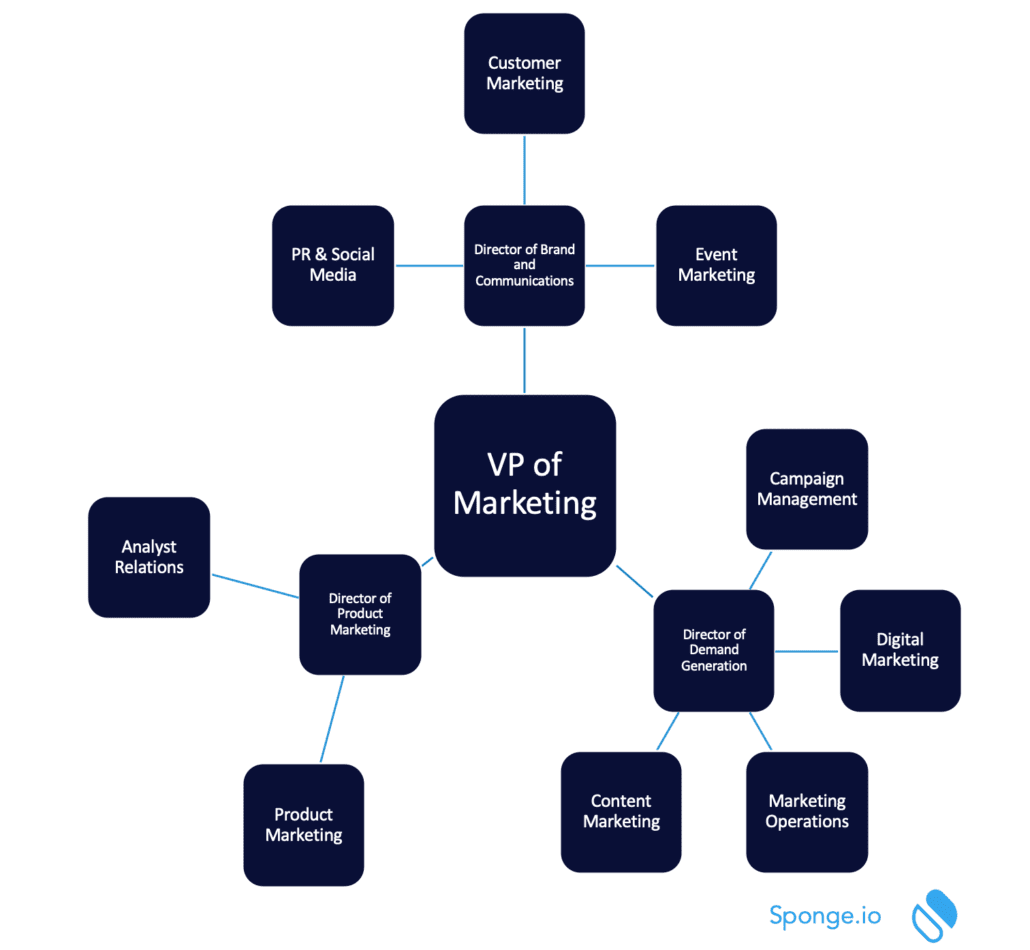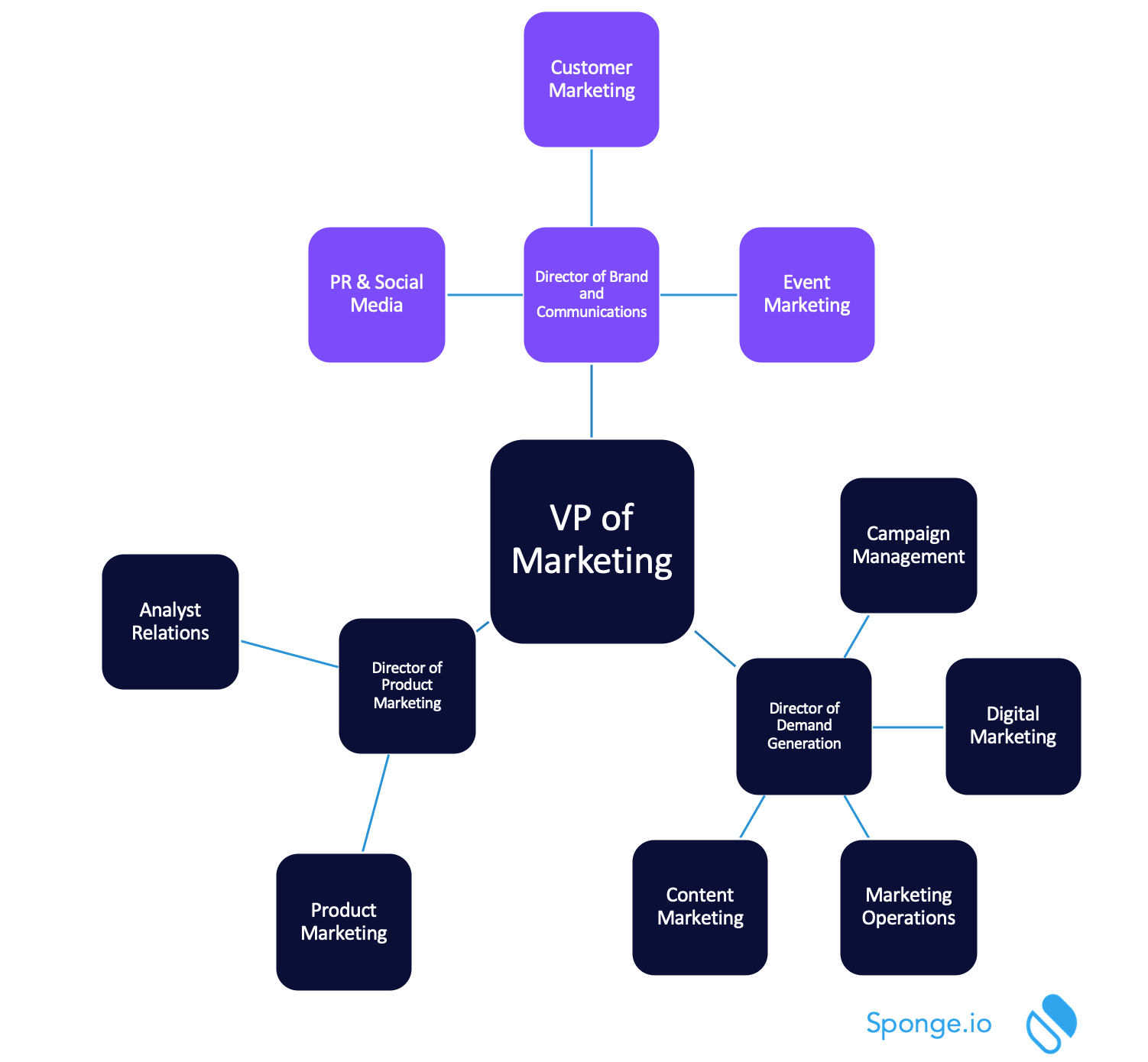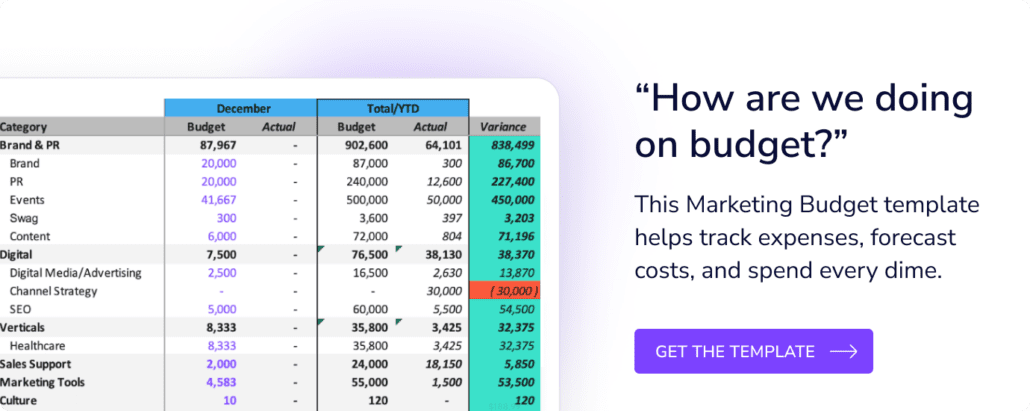Marketing roles and responsibilities have changed dramatically in the last decade, and the mix of people you need on your marketing team is very different than it was in the past. There are new roles and skillsets, new technologies, new mindsets and biases. When CEOs complain about their marketing department, I’ve found it’s not necessarily that the individuals on the team are incompetent. More often, it’s because the marketing team doesn’t have the right mix of skills required to achieve the CEO’s goals, which are often driven by revenue.
>> Related: Marketing’s Shift from Brand to Revenue <<
At my previous company, we fumbled in the dark to build out the marketing team we needed to grow from $10 million to $40 million in revenue by making a lot of mistakes. We hired the wrong people and had to let them go after too much time had passed. When I talk to other marketing leaders, they have similar stories. In this post, I’ll share a team structure that has worked for me in the past, including roles, org chart, and lessons learned on what not to do. Of course, this certainly isn’t the only way to structure your marketing team, but I hope it will provide visibility into the capabilities you need, regardless of how they’re organized.
In this post:
Sample B2B Marketing Org Chart
Here’s the org chart I’d use if I were starting a new marketing roles and responsibilities today from scratch.

I’ve organized the team into three groups: 1) brand, 2) demand generation, and 3) product marketing. Each group is led by a Director, and the whole team is led by the CMO or VP of Marketing. This marketing team is comprised of the following 13 roles:
- VP of Marketing
- Director of Brand & Communications
- PR & Social Media Manager
- Customer Marketing Manager
- Marketing Events Manager
- Director of Demand Generation
- Marketing Campaigns Manager
- Digital Marketing Manager
- Marketing Operations Manager
- Content Marketing Manager
- Director of Product Marketing
- Product Marketing Manager
- Analyst Relations Manager
B2B Marketing Roles and Responsibilities
In this post, we’ll cover the team that is in charge of brand. Branding is important because it how your company is perceived in the market. You have to have a one or two strategies about how you want to brand your company, and then execute those strategies flawlessly. Someone should be able to see a post by your company and immediately recognize it from the coloring and style.
Social Media & PR Manager
Social media is a strong marketing tool used in both B2B and B2C industries. It has so much of an influence on consumers today, that 74% of consumers say their purchasing habits are influenced by what they see friends posting about on their social media feeds. With that much purchasing power allotted to social media it makes sense to have a full time employee managing your social media accounts at all times.
Responsible for:
- Building and managing company social media presence in appropriate channels including LinkedIn, Twitter, and Facebook.
- Generating engaging content for followers to like and share, as well as increase company following.
- Monitoring social media activity and responding immediately to consumer’s issues and concerns in an appropriate manner.
- Identifying social campaigns aimed to engage with target market to produce prospective leads.
- Working strategically with other marketing team members to promote their campaigns through social channels.
Customer Marketing Manager
Marketing campaigns are a great way to communicate with team members, clients, and leads. In today’s tech thriving world campaigns can be used to not only generate sales leads, but also to help progress those leads through the sales funnel. This is easier said than done however, as too much contact with leads can cause them to unsubscribe, and too little contact can cause them to feel unwanted and leave the sales funnel all together.
Responsible for:
- Building and growing company database of sales leads including name, company, title, contact information.
- Automating marketing campaigns process to engage with and nurture leads as they progress through the sales funnel.
- Managing and designing email, blog, webinar, and other campaigns that will be collaborated with other in-house marketing team members.
- Measuring and reporting on key metrics from campaigns such as open rate, conversion rate, and MQL.
Events Marketing Manager
Your events marketing manager is in charge of determining not only what public/private events your company should be involved with are, but also making sure the company is well represented at those events. This persons has great people skills and always seems to meet the important people. They drive growth for the company through attending the right events and interacting with perspective clients. Much of their job is identifying leads and qualifying them quickly for the sales team.
- Identify both public and private events in the community to attend and promote brand awareness and product demand.
- Communicating, maintaining and developing strong client relationships.
- Have projects remain on budget and on schedule for delivery with little to no issues.
- Ensure marketing message is clear and well represented at events by current and prospective clients.
In the third and final post int his series, we dive into the demand group to describe the roles and responsibilities for driving demand for your business. (Or check out the first post here.)





